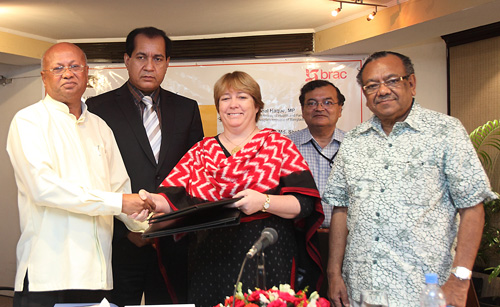08 May 2011, Dhaka. “Government is determined to resolve the problem of blindness in the in the country and achieve the target of Vision 20/20 and that is why Government/NGO partnerships are important.” Prof. Dr. A.F.M Ruhal Haque, Minister of Health and Family Welfare of Bangladesh, said at the Vision Bangladesh Project launching ceremony at the BRAC Inn Auditorium in the city today.
Dr. Haque said, “This is a pro-poor government and invested heavilly on building up health care infrastructures such as 10,000 community clinics for better health care for the poor. NGOs can share various health care data with the government and help them on their efforts.”
Government of Bangladesh recently adopted Bangladesh National Eye Care plan' responding to the Vision 2020 "The Right to Sight" global campaign to eliminate avoidable blindness by the year 2020. The Vision Bangladesh Project, a joint initiative of BRAC, Sightsavers and the Ministry of Health and Family Welfare, has been specifically designed in accordance with the Government’s national eye care plan with an aim towards eliminating avoidable blindness across Bangladesh by the year 2020.

(From Left) Dr. Mahabub Hossain - Executive Director of BRAC, Prof. Deen Md. Noorul Huq - Line Director of National Eye Care & Director-NIO&H, Dr. Caroline Harper - OBE/Chief Executive of Sightsavers, Dr. Wahidul Islam - Country Director of Sightsavers, Dr. Ruhal Haque - Minister of Health and Family Welfare of Bangladesh
Dr. Ruhal Haque was the chief guest of the ceremony which was chaired by Dr. Mahabub Hossain, Executive Director of BRAC. Professor Dr. Khondhaker Md. Shefyetullah, Director General-Directorate General of Health Services, Prof. Deen Md. Noorul Huq, Line Director-National Eye Care & Director-NIO&H and Dr. Caroline Harper, OBE, Chief Executive-Sightsavers also spoke on the occasion.
“Sightsavers is very excited to have government as part of this initiative because once the programme is completed, government’s involvement is the only way to make it sustainable. Our work in Sylhet is a demonstration which we hope we’ll scale up to meet that goal,” echoed Dr. Caroline Harper. The goal of working in Sylhet is to eliminate the backlog of treatable cataract blindness from Sylhet division by the year 2013. In January 2010, Vision Bangladesh began the first phase of this project with screenings and operations in Sylhet.
Blindness is one of the major health care problems in Bangladesh. About 750,000 people are blind including 40,000 children, which are avoidable through proper treatment and care.
80% of blindness in the country is from easily treatable cataracts – occurring in both young adults and children, not just the elderly. Every year, 150,000 more cases are added to the backlog of nearly one million poor people who are denied the simple procedure that could save their sights – and their future. Cataract surgery is one of the most cost effective health interventions. BRAC’s community health workers will be trained and used to identify patients with needs of such surgery. The project will be jointly funded by Sightsavers and BRAC and with the government’s help will be integrated into the wider healthcare system.
“One interesting element of the project is that we are asking the diaspora Bangladeshis to come forward and help this initiative as it costs only 20 pounds for a surgery. Bangladeshis living in UK can certainly contribute and give back to their homeland’ said Dr. Mahabub Hossain.
After the completion of the first phase, findings will be shared with the Government and other local partners with a view towards developing a scale up plan to other divisions of Bangladesh. Government also plans to open up its resources and let the programme build eye care facilities at district hospitals and upazilla health complexes.



